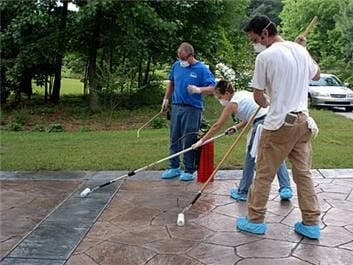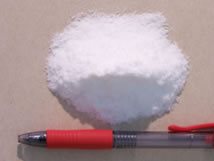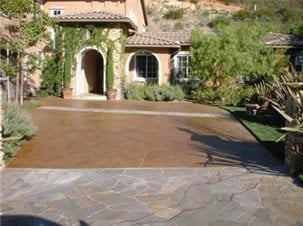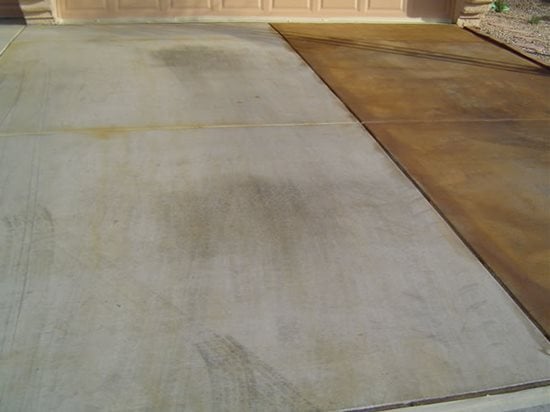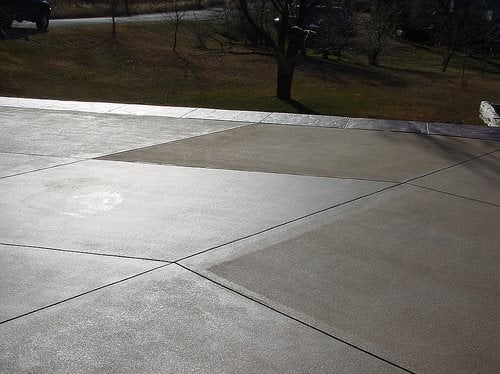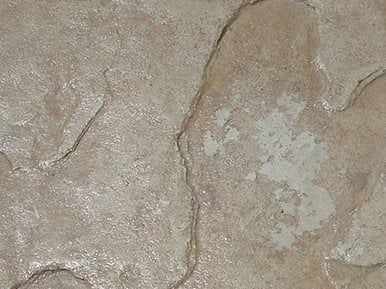- Concrete Driveways Info
- Concrete Driveway Pictures
- Exposed Aggregate
- Stamped Concrete Driveways
- Stained Concrete Driveways
- Modern Concrete Driveways
- Driveway Width
- Concrete Driveway Projects: Submitted by driveway contractors across the U.S.
- Concrete Driveway Cost
- Installing and Maintaining Concrete Driveways
- Concrete Driveway Construction Basics
- How to Clean a Concrete Driveway
- Concrete Driveway Maintenance
- Concrete Driveway Resurfacing
- Concrete Driveway Repair
- Driveway Sealer for Concrete
- Related Information
- Design Ideas: Concrete Driveway Info
- Concrete Contractors: Find Concrete Products and Suppliers
What's the Best Concrete Sealer for Your Driveway?
Extend the life of your driveway by choosing the best concrete sealer and applying it properlyIn general, picking a sealer to use on a concrete driveway is a balance of aesthetics and performance, along with what you are willing to pay to get that performance. Keep in mind that choosing the right sealer and applying it properly will extend the life of your concrete and keep it looking great for years to come, so you should buy the best product you can afford.
Here's the important information you should know about concrete sealer for driveways:
WHY YOU SHOULD USE A SEALER ON YOUR DRIVEWAY
Concrete, in general, doesn't have to be sealed to perform well, but the additional benefits of applying a high-quality sealer to your driveway will be worth the extra pennies per square foot the sealer will cost. Here are the reasons why:
- Sealing a driveway not only extends it service life, it will also improve the appearance of decorative concrete by enhancing the color and gloss.
- Applying sealer to a driveway is not difficult, and in most cases a standard residential driveway can be sealed in less than a day.
- Applying a typical driveway sealer does not require expensive equipment or special skills, so a handy do-it-yourselfer can often tackle the project. Or you can hire a qualified installer to do the work for you.
Find a contractor offering concrete driveway sealing near me.
TYPES OF DRIVEWAY SEALERS
The most common types of film-forming driveway sealers are acrylic-resin based. Acrylic sealers provide the best performance characteristics for the cost, and they often are blended with epoxies, polyurethanes or silicones to improve performance, durability and water resistance. Acrylics, themselves, are also available in different forms, with some types delivering better performance than others. Styrene acrylic, for example, is a lower-performance acrylic resin that may yellow and degrade when exposed to direct sunlight. The best type of acrylic is a virgin or pure acrylic resin. These sealers will last longer than styrene acrylics, with no yellowing.
Other types of topical sealers for driveways are polyurethanes, epoxies and penetrating resins. Generally, epoxy or polyurethane sealers cost considerably more than acrylics and they tend to be higher build, and thus more slippery. They also don't allow for moisture vapor to move out of the concrete. It's important that sealers used on exterior concrete allow the passage of both air and moisture. If a sealer does not allow for this movement, especially moisture, white hazing or fogging can occur between the sealer and concrete (see Preventing Moisture Problems).
Penetrating sealers are made of specialty resins (silicones, siloxanes and silanes) that penetrate into the concrete and form a chemical barrier to water, oil and other common contaminants.
 Deep Penetrating Sealer
RadonSeal - Waterproofs & strengthens.
Deep Penetrating Sealer
RadonSeal - Waterproofs & strengthens.
 Clear-Seal by Increte Systems
Seals and protects decorative surfaces.
Clear-Seal by Increte Systems
Seals and protects decorative surfaces.
 Penetrating Concrete Sealer
$179.95 (5 gal.)
Penetrating Concrete Sealer
$179.95 (5 gal.)
 Kingdom Guard Salt Block Sealer
Resistance to de-icing road salts, rain, sleet and snow
Kingdom Guard Salt Block Sealer
Resistance to de-icing road salts, rain, sleet and snow
 Gem-Guard SB
Penetrating sealer that protects against salt damage
Gem-Guard SB
Penetrating sealer that protects against salt damage
 Water Repellent Penetrating
Sealer for driveways, parking structures, plazas, walkways & more.
Water Repellent Penetrating
Sealer for driveways, parking structures, plazas, walkways & more.
WHAT IS THE BEST CONCRETE SEALER FOR DRIVEWAYS?
To simplify the selection process, I have broken down the most important factors to consider into three categories: Safety, Appearance and Performance. Just remember the acronym SAP.
Safety
The key consideration when sealing a driveway is safety. You want the surface to be slip resistant once the sealer is dry. Most sealers designed for use on driveways will meet federal standards for slip resistance (also known as the coefficient of friction) when the surface is dry. But this doesn't account for how slippery the sealed surface is when wet.
Slipperiness is determined by the amount of texture in the concrete, combined with the thickness of the sealer. Typically, the more sealer resin that's on the surface and the shinier the surface is, the greater the potential for a slippery surface. For example, a smooth concrete surface with a thick "wet-look" film-forming sealer (see Concrete Sealer Types) will be very slippery when wet, while a stamped or heavily broom-finished concrete surface with that same wet-look sealer will not be as slippery. If you use a lower-gloss or thinner sealer, the surface will be even less slippery. Another option is to add a grit or anti-skid additive directly to a film-forming sealer as it's applied. There are several different types, ranging from clear polymer or plastic grit to white silica sand (see Making Concrete Slip Resistant). These additives help, but only to a certain point.
For the ultimate in safety, consider using a penetrating waterproofing sealer rather than a film-forming product. A penetrating sealer produces no gloss and will not contribute to the slipperiness of the concrete surface. Always test the sealer in a small, inconspicuous area on your driveway, in both dry and wet conditions, to ensure that it meets your safety needs.
Appearance
What do you want your driveway to look like after it's sealed, in terms of gloss level and color enhancement? Like paints, driveway sealers come in many gloss levels, including no-gloss, matte, satin, semi-gloss, gloss and high-gloss. Sealer manufacturers use a standardized test to measure gloss on a scale of 1 to 100, with 100 being the highest level of gloss (see the table below). Most sealer manufactures provide this gloss level measurement on the product packaging and in the technical data sheets. But to be sure you are getting the level of gloss you want, it's best to test the sealer in an inconspicuous area of your driveway. (See Sealer Buying Tips)
| Sealer Type | Gloss Level | Finish |
| Solvent based | 80 -100 | Glossy to high gloss |
| Water based | 50 - 80 | Matte to semi-gloss |
| Penetrating sealer | 0 | No gloss |
In terms of color, solvent-based film-forming sealers tend to darken or enhance the color of the concrete more than water-based sealers. Sealers with a higher solids content will also result in more darkening or color enhancement, giving the surface that wet look some people find desirable. The higher the solids content of a sealer, the higher the level of gloss. For example, an 18% solids content usually provides a semi-gloss finish while a 30% solids content will impart a high gloss. Penetrating sealers do nothing to change or enhance the color of the concrete.
If you're looking for a more realistic and natural stamped driveway, high gloss sealers should be avoided. “I hardly ever get any customers asking for a gloss look any more,” says C. J. Salzano of Salzano Custom Concrete in VA. “The trend is matte or a no-gloss look, very natural. After all, aren’t we trying to simulate natural stone? I don’t know many stones that are naturally glossy.” Sealers that provide color enhancement without producing a wet or glazed appearance can be found. These new-generation sealers for stamped concrete come in both solvent- and water-based versions, and they are gaining wider acceptance in the industry. You can also use penetrating sealers, which were rarely used in years past, but are also starting to gain mainstream acceptance.
Performance
Not all driveway sealers are alike (even those in the same product category), and no driveway sealer will last forever. Depending on the type of sealer used and exposure conditions, a sealer may last anywhere from 1 to 3 years. The type and quality of the resin makes a big difference in how long the sealer will last and how well it will perform during its life cycle.
Without going into a doctoral thesis on the chemical makeup and performance characteristics of driveway sealers, let's just say that you typically get what you pay for. Lower-cost sealers bought at your local hardware store usually can't match the quality and performance of commercial professional-grade sealers bought at a concrete materials supply house.
BUYING TIPS
Before buying any driveway sealer, read the technical data sheet as well as the product label. Most suppliers will have technical data available on their websites, and it can tell you a lot about what you're getting. Key words or phrases to look for are non-yellowing, waterproofing, dust proofing, breathability and resistance to oil, grease, and acids. The product should have detailed instructions on how to apply it as well as recommendations for maintenance and re-application.
Also ask the people behind the counter at the concrete products supply store for their recommendations. Which concrete driveway sealer do they sell the most of and have the fewest number of complaints or call backs about? It's always better to spend a few extra dollars on a concrete sealer with proven performance than to go with a cheaper product that may fail early and require stripping and removal.
HOW TO APPLY CONCRETE SEALER ON A DRIVEWAY
Before sealing, make sure your driveway is clean and dry (see How to Clean a Concrete Driveway). The two most common methods of applying sealers to driveway surfaces are by roller or sprayer. Always refer to the manufacturer's recommended application guidelines. As a general guide, solvent-based sealers are best spray applied while water-based sealers are best applied by roller.
Related: How to Seal Stamped Concrete
Whether you are rolling or spray applying a sealer, always strive for maximum coverage. The typical coverage rate is 250 to 300 square feet per gallon. It's best to apply two thin coats, making sure the sealer doesn't puddle or form uneven, thick areas.
Once you seal your driveway, you are still committed to some regular maintenance. This usually consists of nothing more than a good soap and water cleaning, followed by a light re-application of the same sealer if needed. (See How to Maintain Your Concrete Driveway.)
TECHNICAL ADVICE FOR SEALING CONCRETE DRIVEWAYS
Decorative concrete expert, and vice president of sales and marketing with ChemSystems Inc, Chris Sullivan, provides in-depth answers to common problems associated with sealing concrete driveways.
